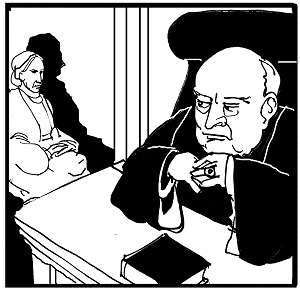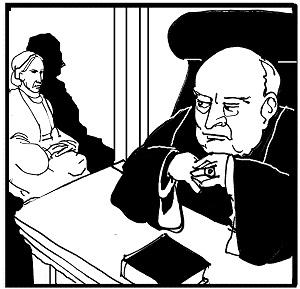

“When the Son of Man comes, will he find any faith on the earth?” (Luke 18:8).
We are hearing a lot about “quid pro quo” in the news these days. This Latin phrase describes any transaction in which something is given in order to receive something. The concept underlies most business deals, from the agreed-upon price for a product to more complex contracts and their specified conditions.
Today’s readings are about prayer, and it is natural for us to ask whether prayer is a “this for that” transaction with God. It seems so in the first reading from Exodus as Moses has God’s favor as long as he keeps his arms raised in prayer when the Israelites are battling the Amalekites.
In today’s Gospel, Jesus emphasizes the need for persistence in prayer. The parable of the widow and the unjust judge could be taken as encouragement to keep praying until a reluctant God finally gives you what you want, but the point of the story and of other parables about human interactions is that God is not like the unjust judge. God is like a parent who would never give a snake if his child asked for an egg, or a stone instead of bread. God is greater than the most intimate relationship we know—that of parent to child. And even if a mother were to forsake her child, God will never abandon us. God is always present and immediate for those who ask.
So why is persistence so important. If it is not about changing God, then it must be about changing us. For Jesus, prayer was not a series of transactions with God, but an ongoing relationship that encompasses our entire lives. To have faith is to come to know God over time through every kind of experience and at each stage of our growth, so that we trust that God is always there, always loving us and providing for us.
When a faith-filled person prays, they are entrusting themselves to God’s care. Whatever they need will be given in the best way and at the best time possible. If a prayer seems delayed or redirected to some other goal, it is because God is at work in the larger context of what we truly need. It is often only in hindsight that we realize how wise God is in withholding one thing but giving another, or in delaying one request to grant an even larger blessing.
Author Truman Capote’s final, unpublished book was titled “Answered Prayers,” based on a quote Capote attributed to Saint Teresa of Avila: "More tears are shed over answered prayers than unanswered ones." Capote knew many famous artists, celebrities and socialites whose lives, like his own, were self-destructive because they had the money and influence to get everything they wanted. All their prayers, so to speak, were answered. Unanswered prayers, on the other hand, are what teach us wisdom and patience. They are the long-term, postponed goals that force us to refine our personal desires to respect the needs of others and accept the limits of human achievement, while expanding our horizons and sharpening our longing for the wholeness only God can give, if not here than in eternity. Some unanswered prayers are like beacons that guide us toward heaven.
Prayer is the heart of every love relationship, human or divine. Human lovers discover each other, wait for each other to respond without rushing the moment or demanding satisfaction and expecting a return on their investment. More young marriages are harmed by unrealistic expectations than external challenges and disappointments. Prayer is a process of deepening intimate communication skills, listening with the heart, remaining silent or speaking a difficult truth in the opportune moment. God is this kind of lover.
The widow persisted and got justice. Jesus is telling us to persist for love, to grow day by day, discovery by discovery, crisis by crisis, to deepen our relationship with God until we arrive at where God has always been, waiting for us. If we have this kind of persistence, the earth will never be without faith.
Advertisement




